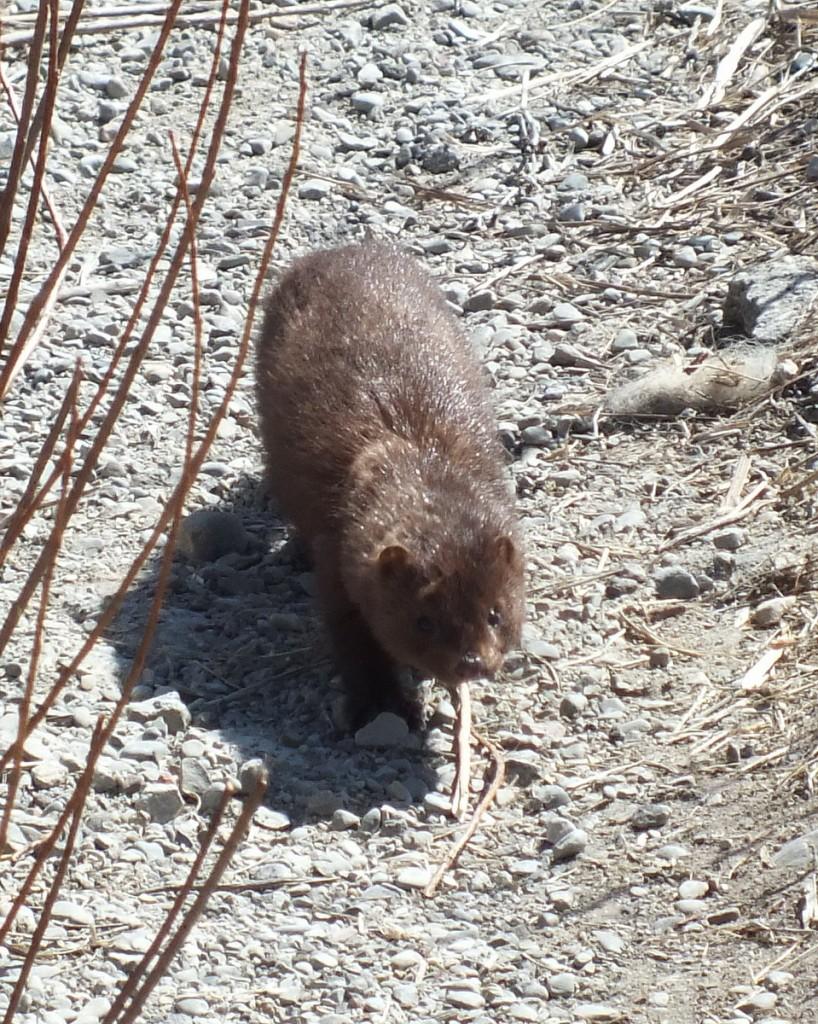
A pair of Bald Eagles have made their nest in a tall pine tree at Cootes Paradise, part of the Royal Botanical Gardens, in Burlington, Ontario. Although they have nested in the same area for a number of years, this is the first time that the pair have laid eggs, and two eaglets have hatched.

This is the first time in decades that Bald Eagles have successfully raised a brood on the Canadian shores of Lake Ontario, so it is very exciting. Due to the widespread use of DDT prior to 1970, Bald Eagles became almost extinct in the area. Further to that, at one point there were only 4 active Bald Eagles’ nests in the Great Lakes region and only 15 surviving birds.

When Bob and I learned that the eaglets had hatched, we could hardly wait for the chance to go and see them…be witness to this momentous event in the world of conservation efforts.

Once at the Arboretum, it is necessary to hike on a series of trails, commencing with Lilac Walk, along Captain Cootes Trail, connecting with Bulls Point Trail and finally branching off onto the Marshwalk Trail. The trails wander through lovely mixed forests, but Bob and I also enjoyed the variety of conditions afforded by several boardwalks, stream crossings and lookouts along the way.

By following the marked pathways, we eventually found ourselves at the edge of Cootes Paradise Marsh, where the Marsh Boardwalk provides closer access to the edge of the water. It is from that boardwalk that bird watchers can observe the Bald Eagles’ nest.

Cootes Paradise Marsh is a wetland tucked away at the westernmost end of Lake Ontario. Hamilton Harbour is located between the marsh and Lake Ontario proper, but an isthmus of land separates the marsh from the harbour, so it is well protected.

The Bald Eagles have chosen well. Bald Eagles require at least 100 hectares of forest to nest and roost, plus an adjacent 50 hectares of wetlands to allow them to catch fish. They have been nesting along the north and south shores of Cootes Paradise Marsh since 2009.

The pine tree in the center of our photograph is where the bald eagles have built their nest. The tree lies within Hopkins Woods Special Protection Area along Spencer Creek. Hopkins Woods is off-limits to the public as it is a sanctuary for sensitive species.


By providing a marsh boardwalk and lookout, the Royal Botanical Gardens has created ample space for bird watchers who want to set up their tripods or just relax and watch the plethora of bird species flocking to the wetland.

Everyone was mesmerized watching one of the bald eagles soar on high. At one point, it was attacked by another bird that was trying to steal its catch. This is not the best picture of the eagle with its prey, but at least you can see that there is a fish in its talons.
In our video, you get a chance to see one of the Bald Eagles returning to the nest with the fish, and also the on-going life around the nest.

Shortly thereafter, the Bald Eagle swooped in towards the nest.

Over the course of several hours during our visit, the Bald Eagles took turns watching the nest and hunting. As soon as one eagle would return, the other would depart.

With our binoculars, Bob and I could see the adult eagles feeding the eaglets.


Once relieved of its responsibilities at the nest, this Bald Eagle took a more leisurely approach to watching its surroundings. It sat perched in this tree for lengthy periods of time before flying off in search of the eaglets’ next meal.

The eaglets must have voracious appetites as frequent forays for food were taken over the course of the morning.

The eagle on the nest watches intently as its mate returns with another catch.

That time the Bald Eagle returned to the nest, it appeared to have some species of bird in its grasp. We could see the legs dangling below as the eagle prepared to land.


The eaglets poked their heads up above the rim of the nest in anticipation of being fed.

Bob and I thoroughly enjoyed the peaceful setting of the marsh and chatted with fellow bird watchers to help pass the time as we waited for action to transpire at the eagles’ nest. In the distance, the constant pounding of a Pileated Woodpecker against a tree echoed through the forest, while the familiar conk-la-ree of red-winged blackbirds filled the air above the marsh grasses.

As we made our way back to the trail head, another colourful bird caught our eye.

A Red-bellied Woodpecker was actively searching for insects on the side of a tall tree. These woodpeckers can be distinguished from the Red-headed Woodpeckers by the distinctive zebra-striped back.

Seeing this lovely member of the woodpecker family was just the icing on the cake for Bob and me on that particular day. We plan to return to Cootes Paradise in the coming weeks to check on the status of the eaglets. We hope they have eluded the Red-tailed Hawks that are just waiting for an opportunity to snatch them from the nest.
Checkout some of our other Plant and Animal sightings:

Skunk Cabbage Blooming in Cootes Paradise – A Sure Sign of Spring

Mink Hunts Muskrats in Ontario Swamp
Frame To Frame – Bob & Jean
Bald Eagle with Babies In Nest, Cootes Paradise, Burlington is a post from: Frame To Frame

